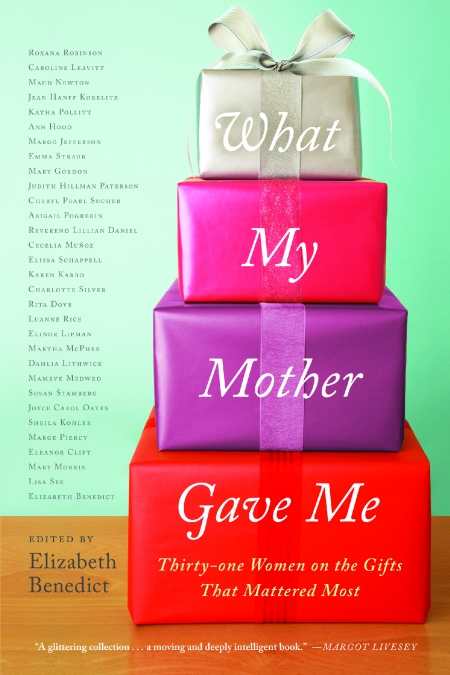
What My Mother Gave Me
Thirty-One Women on the Gifts That Mattered Most
“A single gift can easily tell the story of an entire life,” writes Elizabeth Benedict, editor of and contributor to the anthology What My Mother Gave Me. In the book’s case, a single gift has the ability to tell the story of two lives: mother and daughter. Here, thirty-one women writers spanning five generations essay their way into the stories of their relationships with their mothers, with a particular present serving as the writer’s muse. The impressive lineup of novelists, poets, columnists, journalists, and essayists includes both a National Book Award and MacArthur Fellowship recipient, a US poet laureate, a Pulitzer Prize-winning cultural critic, a television producer, and a civil rights activist.
The essays exhibit varying degrees of nostalgia, grief (most of the mothers having died by the time of the writing), celebration, and revelation; together they underscore the complexity of relationships—no mother is all good or all bad, neither angelic nor beyond the possibility of redemption, either in life or in a daughter’s reconstructed interpretation. The gifts vetted for significance are varying and oftentimes mundane but serve as portals into personal histories: a boat tour, a wok, an old cake pan, a drawing, a plant, a scarf, a book, a necklace, a smiling Buddha figurine.
While every female reader will no doubt hear the notes of her own story played somewhere in the anthology—no matter whether her mother died young, was devoted, withdrawn, alcoholic, highly religious, or a fashionable socialite—the best essays tap into our culture’s shared ideals for what a mother should bequeath to her daughter. In this vein, Jean Hannff Korelitz’s mother, as represented in “My Disquieting Muse,” disrupted her daughter’s unhealthy identification with Sylvia Plath by way of an inscription in one of Plath’s books. Consequently, Korelitz realized she had “inherited endless possibilities” and that she, a feminist, was not obliged to the self-same suffering Plath endured. In “White Christmas,” with the rejection of a Christmas pantsuit, Ann Hood’s mother gave her the gift of permission to “become that person [she’d] dreamed of becoming: a girl who spoke her mind, who was independent and opinionated.”
What My Mother Gave Me shines where it displays the stuff a forward-thinking society wants its women to bequeath and to inherit: lessons about identity, personhood, equality, respect, and—as Joyce Carol Oates penned in “The Quilt”—the knowledge “that love endures in the most elemental and comforting of ways.”
Reviewed by
Heather Weber
Disclosure: This article is not an endorsement, but a review. The publisher of this book provided free copies of the book to have their book reviewed by a professional reviewer. No fee was paid by the publisher for this review. Foreword Reviews only recommends books that we love. Foreword Magazine, Inc. is disclosing this in accordance with the Federal Trade Commission’s 16 CFR, Part 255.
